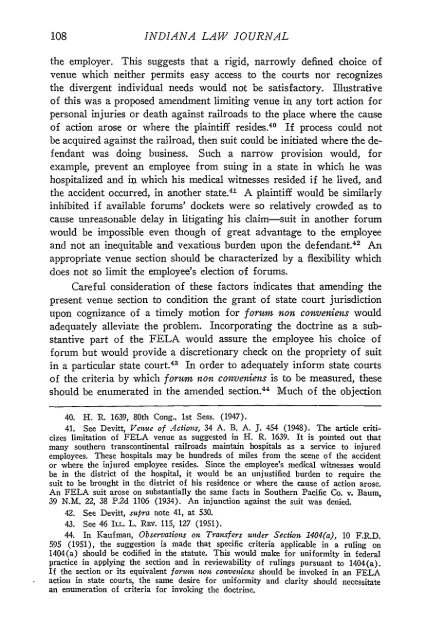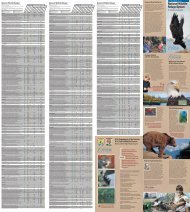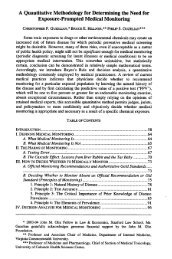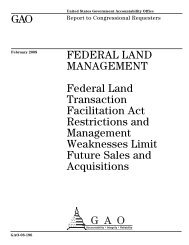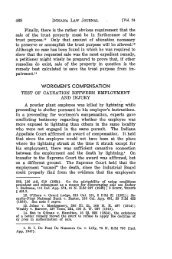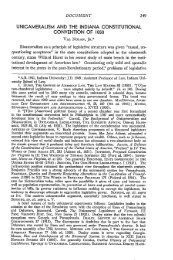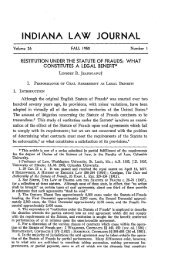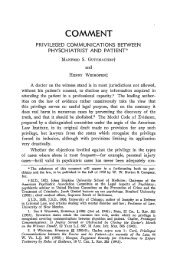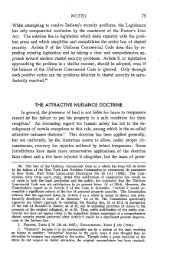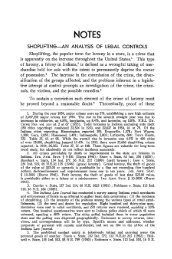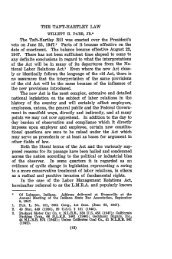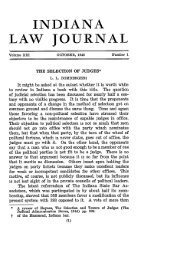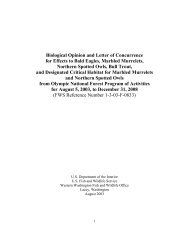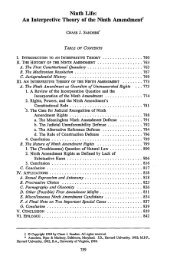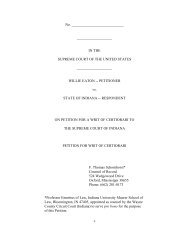fela venue abuse: necessity for congressional amendment
fela venue abuse: necessity for congressional amendment
fela venue abuse: necessity for congressional amendment
You also want an ePaper? Increase the reach of your titles
YUMPU automatically turns print PDFs into web optimized ePapers that Google loves.
INDIANA LAW JOURNAL<br />
the employer. This suggests that a rigid, narrowly defined choice of<br />
<strong>venue</strong> which neither permits easy access to the courts nor recognizes<br />
the divergent individual needs would not be satisfactory. Illustrative<br />
of this was a proposed <strong>amendment</strong> limiting <strong>venue</strong> in any tort action <strong>for</strong><br />
personal injuries or death against railroads to the place where the cause<br />
of action arose or where the plaintiff resides. 40 If process could not<br />
be acquired against the railroad, then suit could be initiated where the defendant<br />
was doing business. Such a narrow provision would, <strong>for</strong><br />
example, prevent an employee from suing in a state in which he was<br />
hospitalized and in which his medical witnesses resided if he lived, and<br />
the accident occurred, in another state. 41 A plaintiff would be similarly<br />
inhibited if available <strong>for</strong>ums' dockets were so relatively crowded as to<br />
cause unreasonable delay in litigating his claim-suit in another <strong>for</strong>um<br />
would be impossible even though of great advantage to the employee<br />
and not an inequitable and vexatious burden upon the defendant. 42 An<br />
appropriate <strong>venue</strong> section should be characterized by a flexibility which<br />
does not so limit the employee's election of <strong>for</strong>ums.<br />
Careful consideration of these factors indicates that amending the<br />
present <strong>venue</strong> section to condition the grant of state court jurisdiction<br />
upon cognizance of a timely motion <strong>for</strong> <strong>for</strong>um non conveniens would<br />
adequately alleviate the problem. Incorporating the doctrine as a substantive<br />
part of the FELA would assure the employee his choice of<br />
<strong>for</strong>um but would provide a discretionary check on the propriety of suit<br />
in a particular state court. 43 In order to adequately in<strong>for</strong>m state courts<br />
of the criteria by which <strong>for</strong>um non conveniens is to be measured, these<br />
should be enumerated in the amended section. 44 Much of the objection<br />
40. H. R. 1639, 80th Cong., 1st Sess. (1947).<br />
41. See Devitt, Venue of Actions, 34 A. B. A. J. 454 (1948). The article criticizes<br />
limitation of FELA <strong>venue</strong> as suggested in H. R. 1639. It is pointed out that<br />
many southern transcontinental railroads maintain hospitals as a service to injured<br />
employees. These hospitals may be hundreds of miles from the scene of the accident<br />
or where the injured employee resides. Since the employee's medical witnesses would<br />
be in the district of the hospital, it would be an unjustified burden to require the<br />
suit to be brought in the district of his residence or where the cause of action arose.<br />
An FELA suit arose on substantially the same facts in Southern Pacific Co. v. Baum,<br />
39 N.M. 22, 38 P.2d 1106 (1934). An injunction against the suit was denied.<br />
42. See Devitt, supra note 41, at 530.<br />
43. See 46 ILL. L. R-v. 115, 127 (1951).<br />
44. In Kaufman, Observations on Transfers under Section 1404(a), 10 F.R.D.<br />
595 (1951), the suggestion is made that specific criteria applicable in a ruling on<br />
1404(a) should be codified in the statute. This would make <strong>for</strong> uni<strong>for</strong>mity in federal<br />
practice in applying the section and in reviewability of rulings pursuant to 1404(a).<br />
If the section or its equivalent <strong>for</strong>um non conveniens should be invoked in an FELA<br />
action in state courts, the same desire <strong>for</strong> uni<strong>for</strong>mity and clarity should necessitate<br />
an enumeration of criteria <strong>for</strong> invoking the doctrine.


